Which Foreign Financial Accounts are Subject to the FBAR Requirement?
Any “person subject to the jurisdiction of the United States” that has “a financial interest in, or signature or other authority over, a bank, securities or other financial account in a foreign country” must report this “relationship” annually as part of the FBAR requirement. The terms “bank, securities or other financial accounts” has specific definitions under the statute. The term “bank account” encompasses “a savings deposit, demand deposit, checking, or any other account maintained with a person engaged in the business of banking,” including certificates of deposit which allow individuals to deposit funds with the banking institution and later redeem the initial amount. The term “securities account” refers to “an account with a person engaged in the business of buying, selling, holding or trading stock or other securities.”
The Meaning of Other Financial Accounts for the Purposes of FBAR Reporting
The
- An “account with a person that is in the business of accepting deposits as a financial agency”
- An insurance policy or annuity with a cash value
- An “account with a person that acts as a broker or dealer for futures or options transactions in any commodity on or subject to the rules of a commodity exchange or association”
- An account with a “mutual fund or similar pooled fund which issues shares available to the general public that have a regular net asset value determination and regular redemptions.”
The IRS has added clarification to the meaning of “financial accounts” by stating that the term may include accounts holding non-cash assets, such as gold, and noting that whether the account generates income throughout the year is irrelevant for the purposes of FBAR filing.
Certain Financial Instruments are Exempt from the FBAR Reporting Requirement
Certain financial instruments are not subject to the FBAR reporting requirement. Hedge funds and private equity funds are not within any categories subject to FBAR regulations unless shares in the fund are “available to the general public.” According to the Treasury, these types of financial instruments were exempt from inclusion in the regulation because their characteristics vary greatly and there is a lack of functional regulation over them. This lack of consistent regulation “makes it difficult to define and distinguish certain types of these funds from others.” Finally, bonds, notes and stocks issued by a foreign issuer and held by a reporting person are not considered “financial accounts” for the purposes of FBAR.
How a Tax Attorney Can Help
Individuals with foreign assets and bank accounts have been under increased scrutiny in recent years. In addition to reporting foreign income, taxpayers must take the important step of filing an FBAR form in order to avoid penalties and fines. In the case where a US person with foreign accounts has gone for years without meeting the FBAR filing requirement, it would be advisable to seek the counsel of a tax attorney with international tax experience.
The Tax Lawyer - William D. Hartsock has been successfully helping clients with tax issues related to their foreign assets since the early 1980s. Mr. Hartsock offers free consultations with the full benefit and protections of attorney client privilege to help people clearly understand their situation and options based on the circumstances of their case. To schedule your free consultation simply fill out the contact form found on this page, or call (858) 481-4844.



Comments (0)